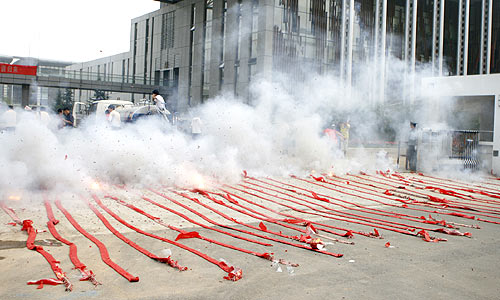Beijing calls for firework restraint
 0 Comment(s)
0 Comment(s) Print
Print E-mail Xinhua, February 6, 2013
E-mail Xinhua, February 6, 2013
Beijing authorities asked the public to cut firework celebrations and said they have reduced stocks of the items, as firework sales began on Tuesday for the upcoming Chinese Lunar New Year.
 |
|
Beijing authorities asked the public to cut firework celebrations and said they have reduced stocks of the items, as firework sales began on Tuesday for the upcoming Chinese Lunar New Year. [File photo] |
Three authorized retailers in Beijing will conduct fireworks sales until the Lantern Festival, the 15th day of the first lunar month.
An official with the Beijing Office on Fireworks and Firecrackers said 750,000 cartons of fireworks would go on sale this year, down from 810,000 in 2012. The number of franchised firework shops has also been reduced to 1,337 from last year's 1,429.
In response to public concern over worsening air pollution caused by the holiday's firework spree, the official asked Beijing residents to set off fewer fireworks for the upcoming celebration.
Prolonged smog shrouded many parts of the country, including Beijing, in January, sparking debates over the tradition of setting off fireworks during the Lunar New Year, or the Spring Festival, which falls on Sunday.
The Chinese have a tradition of ushering in the new year with a huge amount of firecrackers and fireworks, hoping the noise can fend off evil spirits and bad luck. The spree usually starts on the eve of the Lunar New Year, resulting in a spate of accidents including burns and fires.
The official said the office has closely followed Beijing's air quality reports and issued the proposal to citizens via media.
From Jan. 1 to 28, Beijing had 23 smoggy days, about 10 more than on average in the same period in the past 10 years and the most since 1954, said Liang Xudong, head of the Beijing Urban Meteorology Institute.
The average density of PM2.5 tiny airborne matter in January was 180 micrograms per cubic meter in Beijing, about 30 percent higher than the same period between 2009 and 2011, according to meteorological data.
The Beijing Youth Federation has also joined the campaign against the use of firework, saying that although the smog "has been blown away, our fate can not simply depend on the wind."
Several media outlets have initiated an online vote on whether fireworks should be banned after the air pollution, and netizens have responded with much divergence on the issue.
Those for the ban say that the public should take responsibility to improve the capital's air quality, while others believe that the worsening pollution is caused by many factors, but not a result of a few days of fireworks celebration.
After an hours-long firework-ignition spree on the eve of the Lunar New Year in 2012, the density of PM2.5 increased sharply to 1,593 micrograms per cubic meter at one downtown monitoring station, or 1.5 times higher than this year's most polluted day in Beijing.
The capital's meteorological authorities said that they will begin publishing a "Fireworks Index" on Tuesday, providing indications whether the air quality is good enough for fireworks revelry.
An official with the municipal meteorological observatory said that the index will include three categories for firework ignition: "proper," "not quite proper" and "improper."
Big Chinese cities including Beijing had once instituted bans on fireworks, as they are blamed for polluting the air and resulting in injuries and even deaths.
However, Beijing authorities lifted their ban in 2005 under public wishes that fireworks could create a more festive atmosphere. But the government restricted setting off fireworks to within certain areas during a 16-day period around the Spring Festival.






Go to Forum >>0 Comment(s)